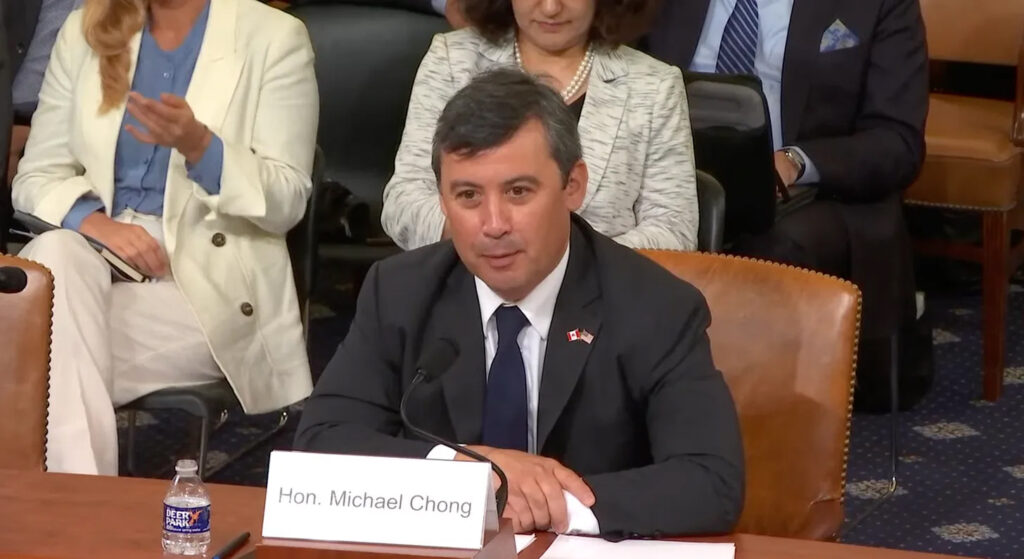Canadian MP testifies before U.S. Congress, says Canada must work more closely with United States to protect citizens and democracy

MP Michael Chong answers a question from Republican Senator Dan Sullivan in a US Congressional hearing, Tuesday September 12.
(Written by Sam Cooper – Originally printed here in The Bureau, reprinted with permission)
Today Michael Chong, testifying for a U.S. Congress body, described how he and his family were targeted by the Chinese regime, outlined a number of foreign interference tactics used by Beijing, and recommended counter-actions Canada should undertake with its allies.
“These tactics cannot be tolerated in a free and democratic country,” Chong said, adding Canada’s election integrity is threatened by Beijing’s agents, and Ottawa should work more closely with the United States and nations including Taiwan, to protect Canada’s national security.
Chong’s recommendations included setting up a foreign agent registry, publicly exposing agents of Beijing that fund Parliamentarians, and implementing stronger laws targeting financial crime and corruption — which are tactics of Beijing’s interference examined exclusively by The Bureau.
“Foreign interference often takes place alongside corruption, including money laundering and covert enrichment,” Chong testified on Tuesday. “Enhancing financial transparency through a beneficial ownership registry covering corporations, trusts and real estate is critical to combatting the corruption that often accompanies foreign interference.”
Republican Senator Dan Sullivan asked Chong whether western democracies should go on “offensive” in exposing the corruption of Chinese regime leaders to its own population, through “covert or overt” operations.
Chong agreed that finding ways to send information past China’s Internet firewall could be effective.
“By naming and shaming bad actors, I think will go a long way in countering this threat,” Chong said.
Testimony on targeting of Canadian politicians
In his testimony, Chong said he learned in May, that PRC diplomat Zhao Wei, “working out of the consulate in Toronto had, since 2020, been gathering information to further target me and my family in Hong Kong.”
This Chinese intelligence operation did not only target Chong, but other MPs deemed to be critical of Chinese Communist Party interests, according to a January 2022 Canadian intelligence report reviewed by The Bureau.
“My experience is but one case of Beijing’s interference in Canada,” Chong testified. “Many other cases go unreported and unnoticed, and the victims often suffer in silence.”
Chong laid out a timeline of significant political actions that evidently placed him in Beijing’s sights.
These included his motion, adopted by the House of Commons in November 2020, which pushed the government to “make a decision on Huawei’s involvement in Canada’s 5G network within 30 days” and “develop a robust plan, as Australia has done, to combat China’s growing foreign operations here in Canada and its increasing intimidation of Canadians living in Canada.”
Next, in February 2021, Parliament adopted Chong’s motion “which recognized the PRC’s actions towards Uyghurs and other Turkic Muslims as a genocide.”
Beijing targets diaspora
Chong testified that Canadian intelligence shows that Beijing’s foreign interference primarily targets the Chinese diaspora in Canada — about 4.7 percent of the nation’s population — and that one prominent tactic is “coaching” Chinese university students into spying.
Chong was asked by Democratic Senator Jeff Merkley if this is a systemic operation.
“Yes, I think it is a systemic, long-term effort,” Chong said. “In many cases, these students are themselves being coerced. Some students are being coerced to spy on other students, through threats of having their study visas withdrawn.”
Chong also testified about Beijing’s use of Chinese-language media in interference operations, and its use of the WeChat platform to target Chong and his family in May 2023.
“It is estimated that WeChat has over one million users in Canada, and that the disinformation regarding me was viewed by between two and five million WeChat users globally,” Chong testified.
Chong said Chinese-language media companies around the world are controlled by Beijing, and their editorial policies become aligned with the Chinese regime, after businesspersons acting as proxies for the regime buy these companies.
Chong named the South China Morning Post and Sing Tao in Canada, in his testimony.
Regarding actions Canada should take, and areas where democracies should co-operate against Beijing’s interference, Chong noted that the U.S., Australia and United Kingdom all have foreign registry laws, but Canada has yet to move forward with legislation.
“Exchanging information on effective legislative models for a registry is an area where democracies can learn from each other,” he said.
He added that Canada’s federal government should adopt the “sunlight” policy demonstrated by the United Kingdom, whose MI5, issued a high-profile public notice in early 2022 to out an agent of Beijing’s United Front Work Department, who was reportedly attempting to influence British politicians through massive donations, and other tactics.
A copy of Chong’s prepared testimony, obtained by The Bureau, and submitted to Congress for the record, said:
“MI5 informed the Speaker about the security threat this individual presented. Members took appropriate action, cut off contact with this individual, and the integrity of the U.K. Parliament was protected. Sunlight and transparency worked, and the integrity of U.K.’s democracy was ensured.”
Canada’s 2019 and 2021 federal elections were targeted by the same United Front networks and methods outed in the U.K. by MI5, but Canada’s federal government and intelligence service has not shone the same public light on the suspects, despite the internal recommendations of some intelligence investigators, The Bureau’s intelligence sources have asserted.
Chong’s testimony apparently supports this view.
“One area for cooperation should include the sharing of best practices among the Five Eyes intelligence alliance about when to release information to the public about the PRC’s foreign interference threat activities,” he testified.
He added, that “foreign interference often takes place through the deliberate spreading of disinformation,” and suggested Canada should learn from Taiwan, on this threat.
“Taiwan is ground zero for the PRC’s disinformation campaigns, and Taiwan has a well-developed multi-faceted policy grounded in building resilience among Taiwanese society while protecting fundamental freedoms.”
In response to another question from the Congressional panel, Chong said international bodies such as Interpol have come under the Chinese regime’s influence and have been used in transnational repression and targeting of critics of Beijing.
“I do think we need to look at reforming Interpol,” Chong said. “We have to make sure that Interpol isn’t used as a tool to arrest,” targets of Beijing.
Editor’s note: MP Chong is reportedly one of several sitting Canadian MPs ever to testify for a U.S. Congress body. A previous version of this story said he was the first.








